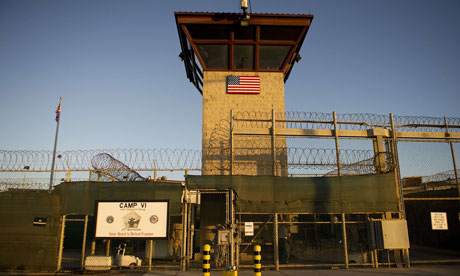
The death occurred in Camp 5, a section of the prison used mostly to hold prisoners who have broken detention center rules. Photograph: Jim Watson/AFP/Getty Images
A former hunger strike prisoner at Guantánamo Bay has died, the US military said Monday, after the man was apparently found unconscious in his cell at the isolated, high-security prison.
The prisoner, whose name and nationality were not released, was found by guards on Saturday and taken to a base hospital, where he was declared dead "after extensive lifesaving measures had been performed," the US military's southern command said in a brief statement.
He was the ninth prisoner to die at the facility since it was opened in January 2002 to hold men suspected of terrorism or links to al-Qaida and the Taliban. The military has said two of those deaths were by natural causes and six were declared suicides.
The death occurred in Camp 5, a section of the prison used mostly to hold prisoners who have broken detention center rules, said navy captain Robert Durand, a spokesman for the prison.
This prisoner had recently splashed a guard with what military officials call a "cocktail," typically a mixture of food and bodily fluids, which is why he was on disciplinary status, Durand said.
He had been on a hunger strike in the past but had resumed eating on June 1 and was at 95% of his ideal body weight and 14lb heavier than when he came to Guantánamo, the spokesman said.
The US still holds nearly 170 prisoners at Guantánamo and they range from men the officials have cleared for release but can't find a stable country to accept them to a handful who have been charged with war crimes. Durand said the man who died Saturday had not been charged and had not been designated for prosecution.
A medical examiner has been brought to the base to determine the exact cause of death and an investigation will be conducted by the Naval Criminal Investigative Service, which is standard in the death of detainees at Guantánamo.
Durand said the US government was working to notify the man's family and his country before releasing further information.
"Certainly we don't want the family finding out in the media before they have been notified," he said.
A mortuary team will wash and place the body in a shroud in accordance with Islamic burial rites before it is shipped back to the prisoner's homeland, he said.
The most recent death was in April 2011, when a 37-year-old Afghan prison died in an apparent suicide. His lawyer told The Associated Press at the time that the man had a long-term mental illness and had tried to kill himself at least once before. Two Saudis and a Yemeni prisoner were found hanging in their cells in June 2006 in what the military determined was a coordinated suicide.

No comments:
Post a Comment